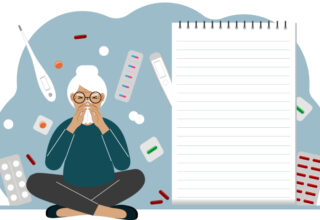We’ve all had those nights—tossing and turning in bed, watching the clock tick by, worried by the thought that tomorrow’s going to be rough. There can be many reasons for sleeplessness, but one factor many of us overlook is our sleep habits.
Poor sleep habits over time can take a serious toll on your physical, mental, and emotional health. That’s where “sleep hygiene” comes in.
But what exactly is sleep hygiene, why it’s important, and how it can help you sleep better? Let’s break it down.
What Is Sleep Hygiene?
Sleep hygiene refers to the habits, behaviours, and environmental factors that affect your quality of sleep. Think of it as a personal toolkit for a better night’s rest.
Just like brushing your teeth, or eating healthy, sleep hygiene can become part of your daily routine that supports both your physical as well as mental health.
Good sleep hygiene means creating a sleep-friendly environment as well as sticking to healthy bedtime practices that help your body know when it’s time to wind down and fall asleep.
Why Is Sleep Hygiene Important?
Getting good-quality sleep isn’t just about waking up refreshed in the morning—it plays a big role in:
- Boosting immune system
- Regulating mood
- Supporting mental and physical health
- Improving emotional regulation
- Enhancing memory and focus
- Balancing hormones and metabolism
- Supporting overall well-being
Without proper sleep your mind and body struggle to function at their best. Over time, poor sleep can also increase your risk of developing chronic diseases like diabetes, heart disease, obesity, and depression.
So if you’re feeling groggy during the day or having difficulty falling asleep at night, your sleep hygiene might need some attention.
10 Simple Sleep Hygiene Tips for Better Rest
1. Stick to a Consistent Sleep Schedule
Your body thrives on routine. Going to bed at the same time everyday—yes, even on the weekends—helps regulate your body’s internal clock also known as your circadian rhythm.
Over time, this consistency makes it easy to fall asleep naturally.
2. Create a Relaxing Bedtime Routine
An hour before bed, start signaling your body that it’s time to wind down. You can try calming activities like taking a warm shower or bath, reading a light book, doing relaxing exercises or light stretching, or sipping a warm cup of milk.
Avoid doing anything emotionally or mentally intense—your goal is to shift your mind into a calm and restful state.
3. Limit Screentime Before Bedtime
Phones, tablets, and TV screens emit blue light, which tricks your brain into thinking it’s still day time. This makes it harder to sleep.
Try to avoid using blue-light emitting devices about an hour before bed. Try swapping screen time with activities that help you relax—like gentle stretching or journaling—before bed.
If you have to use screens for work or study at night, try using “night mode” on your devices. These are easier on your eyes. Try to wear blue-light blocking glasses that protect your eyes from blue light emissions.
4. Make Your Bedroom Sleep-Friendly
Your bedroom should feel like a peaceful place to you. Keep the room cool, dark, and quiet. The recommended room temperature for the most comfortable sleep is around 65 to 68°F (15.6 to 20°C). However, it may vary by a few degrees from person to person.
Use blackout curtains to keep your room dark if outside light sneaks in. Consider using a white noise machine if you live in a noisy area.
Make your bed cozy and inviting—soft sheets, supportive pillows, and a comfortable mattress. They all matter more than you might think.
5. Be Mindful of What You Eat and Drink
What you eat or drink before bed plays a big role in how comfortably you sleep.
Caffeine can stay in your system for hours, so late-afternoon coffee might be sabotaging your sleep.
Heavy meals before bedtime can also lead to discomfort and heartburn, making it harder for you to relax.
6. Get Daylight Exposure
Your body’s sleep-wake cycle depends on natural light clues. Daylight exposure might help increase your sleep duration and improve sleep quality.
Getting outside for 15–30 minutes in the morning or early afternoon can help you feel more alert during the day and sleepier at night.
If you work indoors, try setting your desk near a window or taking short breaks outdoors.
7. Be Physically Active (But Not Too Late)
Exercise helps you sleep better, but timing matters a lot. A brisk walk, yoga, or gym session during the day promotes better sleep at night. Just try not to schedule intense workouts within two hours of bedtime. Your body needs time to cool down before it can settle into the rest mode.
8. Use Your Bed Only for Sleep
If you often eat, work, or watch TV in your bed, your brain starts to associate that space with activity instead of rest. Reserve your bed for sleep—this strengthens the connection between your bed and the act of sleeping and makes it easier to drift off.
9. Limit Naps
Naps can be great for an energy boost. But too much sleep in the day can make it hard for you to sleep at night. If you really need one, try to get a nap for about 20 to 30 minutes and keep it earlier in the day—preferably before 3 p.m—so it doesn’t interfere with your bedtime.
10. Manage Stress and Anxiety
Stress doesn’t just affect your mental health, it can also take a serious toll on your physical health—including disrupting your sleep. (Learn more about how stress affects your body and mind)
Racing thoughts are a common bedtime hurdle. To calm your mind, try deep breathing, guided meditation, or jotting down tomorrow’s to-do list before you get into bed.
This can help reduce stress and get a better sleep by making nighttime relaxation much easier.
When to See a Doctor:
If you’ve made changes in your sleep hygiene and still struggle to fall asleep, stay asleep, or feel restful in the morning, it’s a good idea to talk to your healthcare professional.
You may have an underlying sleep disorder like insomnia and your doctor can provide you help with that.
Final Thoughts:
Sleep hygiene is about small and consistent changes that support your body’s natural sleep cycle.
Try the above tips and see what works best for you. Over time you’ll find your sleep becoming more deep and restful.
A quality sleep is the foundation for a better mood, sharp thinking, and a healthier body all day long.








